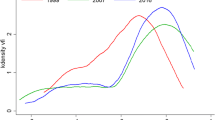Abstract
As one of the strategies local governments adopt in response to fiscal stress, tax competition influences the social optimum level of public goods such as environment. This paper aims to investigate the mechanism of regional tax competitions from the perspective of financial stress. Recently, the effect of tax competition on environmental pollution rises gradually. Existing empirical researches mostly apply a fiscal decentralization-based perspective and ignore the spatial correlation between pollution and tax competition. Under the perspective of financial stress, this paper measures the impact of inter-regional enterprise income tax competition and value-added tax competition on environmental pollution of 30 provinces, using empirical analysis, and then estimates the direct effect, indirect effect and total effect based on it from year 2004–2014. It’s been found that inter-regional tax competition not only brings negative influence to local environment, but also makes the environmental quality become worse in spatial correlation regions. These findings are of enlightening politic revelations to further standardize enterprise tax competition among local governments, and to promote the sustainable development both in economy and environment.


Similar content being viewed by others
References
Anselin L, Florax R, Bera AK et al (1996) Simple diagnostic tests for spatial dependence. Reg Sci Urban Econ 26(1):77–104
Bierbrauer F, Brett C et al (2013) Strategic nonlinear income tax competition with perfect labor mobility. Games Econ Behav 82(1):292–311
Bjorvatn K, Schjelderup G (2002) Tax competition and international public goods. Int Tax Public Finance 9(2):111–120
Brueckner JK (2003) Strategic interaction among governments: an overview of empirical studies. Int Reg Sci Rev 26(2):175–188
Chirinko R, Wilson DJ (2011) Tax competition among US states: racing to the bottom or riding on a seesaw?. Federal Reserve Bank, San Francisco
Cremer H, Gahvari F (2004) Environmental taxation, tax competition, and harmonization. J Urban Econ 55(1):21-45
Cremer H, Marchand M, Pestieau P (1997) Investment in local public services: nash equilibrium and social optimum. J Public Econ 65(1):23–35
Cui YF, Liu XC (2010) Provincial tax competition and environmental pollution: based on panel data from 1998 to 2006 in China. J Finance Econ 36(4):46–55
Cutter WB, Deshazo JR (2007) The environmental consequences of decentralizing the decision to decentralize. J Environ Econ Manag 53(1):32–53
Dean JM, Lovely ME et al (2009) Are foreign investors attracted to weak environmental regulations? Evaluating the evidence from China. J Dev Econ 90(1):1–13
Frankel JA (2003) The environment and globalization. Nber Working Papers 55(2):161–210
Fredriksson PG, Millimet DL (2002) Strategic interaction and the determination of environmental policy across U.S. States. J Urban Econ 51(1):101–122
Fu Y (2008) Why China’s decentralization is different: an analytical framework considering political incentives and fiscal incentives. J World Econ 11:16–25
Han L, Kung KS (2015) Fiscal incentives and policy choices of local governments: evidence from China. J Dev Econ 116:89–104
He J, Liu LL, Zhang YJ (2016) Tax competition, revenue decentralization and China’s environmental pollution. China Popul Resour Environ 26(4):1–7
Ihori T, Yang CC (2009) Interregional tax competition and intraregional political competition: the optimal provision of public goods under representative democracy. J Urban Econ 66(3):210–217
Keen M, Marchand M (1997) Fiscal competition and the pattern of public spending. Core Discussion Papers RP 66(1):33–53
Letchumanan R, Kodama F (2000) Reconciling the conflict between the ‘pollution-haven’ hypothesis and an emerging trajectory of international technology transfer. Res Policy 29(1):59–79
List JA, Co CY (2000) The effects of environmental regulations on foreign direct investment. J Environ Econ Manag 40(1):1–20
Liu J, Li W (2013) Environmental pollution and intergovernmental tax competition in China: based on spatial panel data model. China Popul Resour Environ 23(04):81–88
Liu JM, Wang B, Chen X (2015) A study on the nonlinear effect of political decentralization on environmental pollution—based on the PSTR model analysis of the panel data in 272 cities, China. Econ Perspect 03:82–89
Markusen JR, Morey ER, Olewiler N (1995) Competition in regional environmental policies when plant locations are endogenous. J Public Econ 56(1):55–77
Millimet DL (2010) Assessing the empirical impact of environmental federalism. J Reg Sci 43(4):711–733
Oates WE (1972) Fiscal federalism. Harcourt Brace Jovanovich, San Diego
Pace RK, Lesage JP (2008) Biases of ols and spatial lag models in the presence of an omitted variable and spatially dependent variables. Social Science Electronic Publishing
Rauscher M (2005) Economic growth and tax-competing leviathans. Int Tax Public Finance 12(4):457–474
United States. Advisory Commission on Intergovernmental Relations, Kenyon DA (1991) Interjurisdictional tax and policy competition: good or bad for the federal system? Advisory Commission on Intergovernmental Relations, United States
Wang H, Jin Y (2007) Industrial ownership and environmental performance: evidence from china. Environ Resour Econ 36(3):255–273
Weingast BR (2009) Second generation fiscal federalism: the implications of fiscal incentives. J Urban Econ 65(3):279–293
William JB, Oates WE (1988) The theory of environmental policy: efficiency without optimality: the charges and standards approach. Cambridge University Press, Cambridge
Wilson JD (1999) Theories of tax competition. Natl Tax J 52(2):269–304
Woods ND (2006) Interstate competition and environmental regulation: a test of the race-to-the-bottom thesis. Soc Sci Q 87(1):174–189
Xu C (2011) The fundamental institutions of China’s reforms and development. J Econ Lit 49(4):1076–1151
Zhang T, Zou HF (1998) Fiscal decentralization, public spending, and economic growth in China. J Public Econ 67(2):221–240
Author information
Authors and Affiliations
Corresponding author
Electronic supplementary material
Below is the link to the electronic supplementary material.
Rights and permissions
About this article
Cite this article
Bai, J., Lu, J. & Li, S. Fiscal Pressure, Tax Competition and Environmental Pollution. Environ Resource Econ 73, 431–447 (2019). https://doi.org/10.1007/s10640-018-0269-1
Accepted:
Published:
Issue Date:
DOI: https://doi.org/10.1007/s10640-018-0269-1



